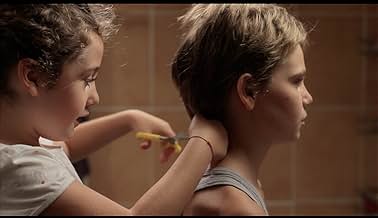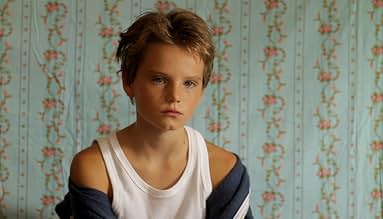Tomboy
- 2011
- Tous publics
- 1h 22min
Une famille déménage dans un nouveau quartier et Laure, une fillette de 10 ans, se présente intentionnellement aux enfants du quartier sous le nom de Mickäel.Une famille déménage dans un nouveau quartier et Laure, une fillette de 10 ans, se présente intentionnellement aux enfants du quartier sous le nom de Mickäel.Une famille déménage dans un nouveau quartier et Laure, une fillette de 10 ans, se présente intentionnellement aux enfants du quartier sous le nom de Mickäel.
- Récompenses
- 10 victoires et 6 nominations au total
Avis à la une
Michael becomes close to Jeanne(Malonn Levana), plays soccer, has water fights and swims with the other kids in what could be a typical summertime anywhere.
The child-actors, particularly Zoe Heran are very believable. Laure/Michael is on screen most of the time and is an actress to watch for in the future.
Zoe(Michael/Laure) is contrasted with a very feminine little sister illustrating how different even close siblings can be. Most directors don't edit enough, but this feature felt a bit short at 79 minutes. It is worth your time for Ms. Horan's performance.
The film works in large part due to the casting. Zoé Héran as Laure / Mikael is so convincing as a boy that when she does finally don a dress it just looks... wrong. A double for a young Sting, she has an easy charisma and strong expression that makes her every move unmissable. Mikael is befriended by Lisa, a precocious Jeanne Disson, and young love blossoms in bizarre circumstances. As strong as these two performances are, Malonn Lévana Malonn as Laure's little sister Jeanne steals every scene she is in. Given a secret to keep half-way through, she crackles and delights every time you see her and wonder if she can keep the confidence.
As delightful as the children are, the theme of a young girl yearning to be a boy is presented but hardly explored. The film is episodic, one summer in the life of a mixed up girl. Laure's reasons for taking things so far are never dealt with beyond surface levels, and no resonance to wider concerns in society are present. The narrative strains with such insubstantial fare, but never breaks. Fans of such coming-of-age tales as Stand By Me or Yamada's Village of Dreams will enjoy this tale.
The Tomboy is Laure, a 10-year-old girl whose family just moved to a leafy suburb. She has a summer to spend before school starts, and for reasons unclear even to herself, decides to fake it as a boy. Zoé Héran, the actress, is a remarkable performer and will be a remarkable French beauty in another decade, but in the film appears as a wiry, scrawny child who wears feminine clothes only on pain of motherly torture. She runs in the forest, scraps around with boys, and can get away with being on the "shirtless" team in the soccer game.
Here's something amazing about Héran's performance: I kept having to remind myself that she speaks. In fact, she probably has more lines than anyone else in the movie, but they seem ephemeral compared to the great work that silently goes on in her mind. The camera watches her think with such intensity and expression, and since this is not a dumb movie, we don't get a voice-over that explains the obvious. We know what she's thinking: how will I continue the deception on the field and in the lake? How will I prevent my family from finding out? And, in quieter moments, other thoughts, other sensations, attempts to understand things that she can feel but hasn't yet learned the words for.
Her self-discovery is framed by a supporting cast that includes tender and attentive parents, a cute little ball of energy for a younger sister, a neighborhood girl who's attracted to the mysterious stranger, and a colorful group of rambunctious but good-natured boys.
Tomboy was made for peanuts, and there's no telling what it would have looked like with a few million dollars to spend, but the feel and sound of it are perfect. In the day, the hiss and rustle of trees; at night, the taps and groans of the house in the wind. I watched it in a dark, dusty room on a New England January, and I could almost feel the sunlight on my own skin.
In the end, despite Laure's anxieties, this is a movie that shines with joy. A wide-open world of familial love, summer play, first romance, none of which is packaged to be bought or sold. None of that first-world paranoia, no fences and kidnappers and card readers and metal detectors. It's a picture of the days when half an hour of homework was a jail term, three months of summer were a lifetime, and childhood itself was a sky-blue eternity of invented games, skin-deep catastrophes and ineffable comfort at the steady hands of the people who wish us best.
P.S. Then again, we adults have our own joys, such as the dismal, acrid laughter at the stupidity of others. This movie didn't go unnoticed on the arch-conservative website The Free Republic, which claims that the main character is a lesbian (the word doesn't actually appear once in the script, and the director is on record saying she specifically wanted to avoid pigeonholing her protagonist). Of all the extraordinarily strong opinions expressed in the forum thread, not one appears to be informed by an actual viewing.
The discussion starts out by claiming that the movie "exploits small children to advance progressives' bizarre sexual agenda;" it takes a detour through gender reassignment surgery, underage sex and ends in a starkly pornographic debate about bestiality.
It's a trope that guardians of morality often have infinitely filthier and more disturbing minds under their helmets than the people whose work gives them shrieking fits. The debauched French have made a serene and charming movie about family and friends, whereas our self-anointed protectors of children's minds and bodies used it as a springboard into bottomless perversity. The moral: if you have a choice between reading a dour political site and watching a French children's movie, go with the movie.
Le saviez-vous
- AnecdotesScript written from April 2010. The main actress was found on the first day of casting. The film was shot in twenty days in August 2010 with a crew of fourteen.
- GaffesAfter the fight over the attack on Jeanne - which Laure wins, Laure attentively dresses the graze on Jeanne's knee, and adds a blue-coloured sticking plaster (Band-Aid). In the next scene, when the (unnamed) mother finds out that Laure has been passing herself off as a boy, she demands that Laure wear a dress when they both go to the neighbour to apologise. Laure is sitting on the bed with Jeanne, but all traces of Jeanne's knee injury, and even the sticking plaster, have disappeared.
- Citations
Rayan: [subtitled version]
[to Laure]
Rayan: We hear you're a girl. We're gonna check that.
Lisa: Stop it! What do you think you're doing?
Rayan: We're gonna check if she's really a girl.
Lisa: Leave him alone.
Rayan: You're right. It's YOU who'll check.
Lisa: No, I won't.
Rayan: If she's a girl, then you kissed her. It's disgusting. Right?
Lisa: Yes, it's disgusting.
Rayan: Then, you're gonna do it.
[Lisa pulls down Laure's pants]
- ConnexionsFeatured in Women Make Film: A New Road Movie Through Cinema (2018)
- Bandes originalesAlways
Written by Jean-Baptiste de Laubier and Jerôme Echenoz
Published by Because Editions/Copyright Control
& © 2011 Para one & Tacteel
Meilleurs choix
- How long is Tomboy?Alimenté par Alexa
Détails
- Date de sortie
- Pays d’origine
- Sites officiels
- Langue
- Aussi connu sous le nom de
- Giới Tính Thứ Ba
- Lieux de tournage
- Sociétés de production
- Voir plus de crédits d'entreprise sur IMDbPro
Box-office
- Budget
- 1 000 000 € (estimé)
- Montant brut aux États-Unis et au Canada
- 129 834 $US
- Week-end de sortie aux États-Unis et au Canada
- 7 078 $US
- 20 nov. 2011
- Montant brut mondial
- 1 424 716 $US
- Durée1 heure 22 minutes
- Couleur
- Mixage
- Rapport de forme
- 1.85 : 1
Contribuer à cette page

























